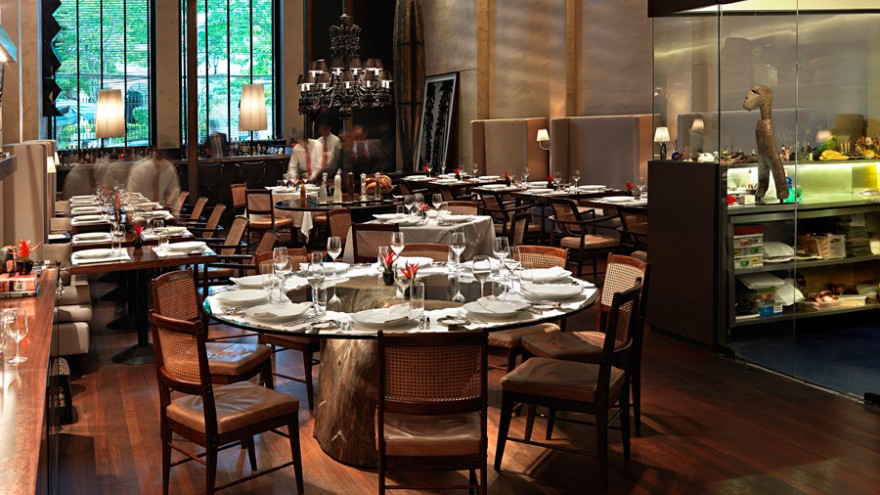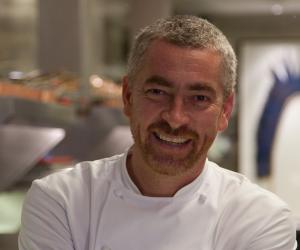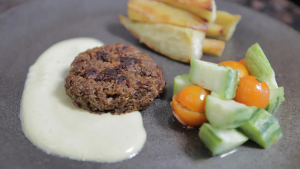It is our great pleasure to welcome renowned Brazilian chef Alex Atala as a speaker to Design Indaba Conference 2013.
Atala's work is concerned with reinterpreting traditional Brazilian cuisine, with much of his work also focussing on the sustainable cultivation of food.
Atala's biography reads like a story and so we share it here:
Alex Atala
When Alex Atala opened his restaurant D.O.M. in 1999, he made a decision that was to change the history of modern Brazilian cuisine.
Up until then, many restaurants in his home city of Sao Paulo were more French or Italian and impervious to the nation’s indigenous ingredients.
Traditional family dishes were considered too homely to be served on a fine dining basis and restrained to street food. Yet for years in other countries like Spain, Italy and France, classic home cooking had been refined and was being served in top gastronomic restaurants.
Atala wanted to change the way his nation was considered on a plate and believed ingredients like acai, pupunha or cupuacu to be the very essence of Brazil and that their uniqueness should be celebrated.
“We needed a pride in our cuisine. The way the Brazilian composer Villa-Lobos was proud of our music,” Atala said.
Having trained in Europe at the École Hôtelière de Namur in Belgium, then in some of finest Michelin restaurants in Italy and France, he realised, without ready access to the supply of quality ingredients, he would never be able to truly translate European food on a gastronomic level back in Brazil.
What he did believe was that he could take the tastes and flavours of his own country and bring the very best of Brazilian ingredients to a fine dining restaurant.
In 1999, he opened D.O.M. (from the Latin, Deo Optimo Maximo – God is Great and Exceeding – good in his wisdom and exceeding in his kindness) in Sao Paulo, not only to create an exceptional gastronomic experience using local ingredients, but one that captured the flavours, colours, textures and even smells of what it was to eat in Brazil.
In essence, Atala applied European techniques to Brazilian ingredients creating anything up to 20 course tasting menus that included, for example, Palm Heart Fettuccine; Pirarucu with Tucupi; and Banana Ravioli with Passion Fruit Sauce and Tangerine Sorbet.
D.O.M was simply what Brazil tasted like.
It soon became the most popular restaurant in the city with food lovers, critics, chefs and a huge celebrity clientele. The concept of D.O.M. was ahead of its time and its ethos helped clear the way for other restaurants.
D.O.M. was soon to become Brazil’s most famous destination restaurant with Atala winning numerous awards including Chef of the Year and Best Contemporary Cuisine by Veja Sao Paulo and Chef of the Year and 3 Stars on Guia 4Rodas.
For Atala though, the process of flying Brazil’s culinary flag was more than just constrained within the walls of the restaurant.
Developing menus with a strong presence of native ingredients required time and research. Some of that research had been far-reaching into the Amazon rainforest.
With issues of deforestation and the impact of habitat loss at the fore of his mind, Atala was acutely aware of the fragility of the rainforests’ eco-system and the tribal lifestyles it supported. He knew if his work into his nation’s culinary heritage was to continue, he would need to be sensitive to both the people who inhabited the Amazon and the rainforest itself.
Over the years, with the help of the Social Environmental Institute, Atala has worked meticulously with scientists and anthropologists to discover and classify foods and document new products from the Amazon region, with minimum impact on both forest and people.
Some of this research has included the significant discovery of a new variety of wild palm heart perfectly adapted for farming. In the past, a palm tree was destroyed to harvest its single 700g heart. This new variety is faster growing with five to eight side shoots, meaning that it can be harvested at different times without killing the tree.
Another discovery was priprioca root. He found out it was edible and developed an extract that can be used in both savoury and sweet dishes, a bit like vanilla. With the help of his agricultural contacts and the native families living nearby, Atala has helped create farms that harvest and cultivate priprioca specifically in areas where there used to be deforestation.
He has even taken his Eco Gastronomy one step further, and now owns an area of Amazonia where 30 to 40 families live in peace. His only request is to occasionally and sensitively forage the area, which is rich in local produce, for his research and development work.
Without a doubt, Atala’s unbridled creativity, passion and dogged ambition for Brazilian produce and ingredients, is tempered only by his sensitive, sustainable and intelligent methods in cultivating them.
His ambition now is to promote Brazilian produce on an international scale, and hopes that given time and the development of sustainable farming strategies, palm hearts and acai berries, become as normal as pasta or blueberries in store cupboards throughout the world. His first product “Mini Arroz”, an exclusive variety of rice by grower Francisco Ruzene, has already been launched under the brand “Retratos do Gosto”.
In January 2009, he opened a second restaurant Dalva e Dito focussing on Brazilian heritage dishes based on home recipes.
He is the author of three books, Por uma Gastronomia Brasileira (Bei editora, 2003), Com Unhas, Dentes & Cuca (Editora Senac) and Escoffianas Brasileiras (Larrouse Brasil). His latest is due to be released by Phaidon in 2013.
D.O.M. has been continually listed over the past seven years in the The World’s 50 Best Restaurants by the UK-based magazine Restaurant. D.O.M. presently holds 4th position on the 2012 list.












